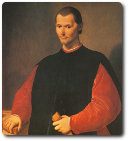Othello Contents
- Religious/ philosophical context
- Theatrical context
Revenge tragedy
Origins of revenge tragedy
The revenge tragedy was very popular during the Elizabethan and Jacobean period. An early example is Thomas Kyd's The Spanish Tragedy; probably the most famous example is Shakespeare's Hamlet. Although ideas about tragedy and other forms of drama originally came from Ancient Greece, Greek was not widely understood and it was the works of the Roman dramatist Seneca that popularised tragedy in Elizabethan England. Seneca's works were first translated into the English language in 1559, and by 1581 Senecan tragedies had circulated widely among the English literate.
In Seneca's plays the element of impiety towards the gods was replaced by the theme of revenge. In consequence, the emotions displayed were crude rather than elevated and various devices were employed in these plays, which added to the atmosphere of terror and retribution. These became common features of the genre.
Other critics have argued that, in addition to Seneca's influence, the Italian novella provided another literary source for the revenge tragedy. Many of these Italian tales feature a sinister, Machiavellian villain, sexual betrayals that culminate in private revenge and bloody vendettas between rival families.
Features of revenge tragedy
Usually one or more characters are exacting revenge, which may well have a ‘snowball' effect.
Machiavellian villain
 The works of the Italian writer Machiavelli were popular at the time. In his book The Prince, he advised kings and other rulers how to plot and be devious in order to keep their power. Such advice was exaggerated in popular sentiment and popularly condemned. When Iago tells Othello that his wife has been unfaithful, Othello’s decision to exact a cruel, heartless revenge on her would have been perceived as ‘Machiavellian’ and thus rejected as unacceptable (rather than excusable) by Shakespeare’s audience.
The works of the Italian writer Machiavelli were popular at the time. In his book The Prince, he advised kings and other rulers how to plot and be devious in order to keep their power. Such advice was exaggerated in popular sentiment and popularly condemned. When Iago tells Othello that his wife has been unfaithful, Othello’s decision to exact a cruel, heartless revenge on her would have been perceived as ‘Machiavellian’ and thus rejected as unacceptable (rather than excusable) by Shakespeare’s audience.Soliloquies
These are necessary, not only for advancing the plot, but also to reveal a character's state of mind. There are important soliloquies from a number of characters, particularly Iago, who tells the audience of his plots and motives on eight separate occasions.
Iago never hides his intentions from the audience, while all the time lying to and deceiving everyone on stage. He seems to delight in his evil plans, which makes the audience appreciate his relish for manipulation whilst condemning its outcomes. Only once does he appear to try to defend himself and engages the audience with his attempts at self-justification. But this rather backfires when the audience realises that his so-called good advice to Cassio is only meant to advance his evil plans still more.
In contrast, Othello has only one soliloquy, which shows how open and transparent he is compared to Iago. In this soliloquy he questions his decision to kill Desdemona, finally justifying it with the belief that it will prevent her from betraying more men with her wiles. Although his reasoning is fatally flawed, the soliloquy enables the audience to see into the agony of his soul.
Murders and corpses
There are usually a number of murders that happen both on and off stage. In Othello, there are three murders, two attempted murders and one suicide, all of them on stage. Two of the killings take place in the street at night, while the other three happen in Desdemona’s bedroom. They are all done with knives or swords, with the exception of Othello’s smothering of Desdemona with her pillow. Both wives are killed by their husbands and the most foolish character in the play is killed treacherously by his own accomplice, Iago.
Sudden reversals
Incidents such as the murder of Emilia in the last scene of Othello were designed to shock the audience and maintain dramatic tension. She suddenly turns against her husband and is murdered by him in revenge. This was as unexpected as the murder of Desdemona was anticipated – although her apparent restoration to life is also a shock, both for the audience and her husband. The several acts of violence in the last act of Othello would keep the audience in a state of shocked horror and maintain the dramatic tension till the end of the play. These are still staple elements of horror films today.
Roman statesman, poet and philosopher, c. 4 B.C. - A.D. 65
supposedly in keeping with the views of the Italian writer and politician Machiavelli (1469 - 1527)
Italian writer and politician (1469 - 1527) who advocated methods of statecraft which were seen as so devious and cunning that his name became a by-word for craftiness and deceit.
